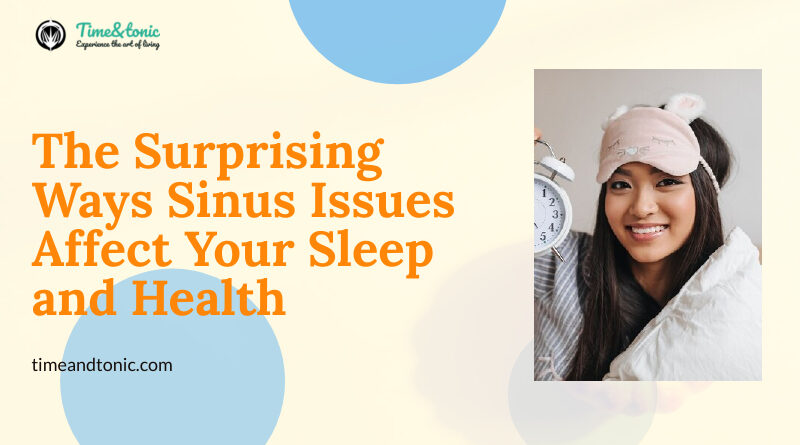The Surprising Ways Sinus Issues Affect Your Sleep and Health
Sinus Issues Affect Your Sleep and Health – Sinus issues, often dismissed as minor inconveniences, have a far-reaching impact on our lives that extends well beyond the occasional stuffy nose or facial pain. These seemingly innocuous problems can wreak havoc on our sleep quality and overall well-being. In this comprehensive exploration, we will delve into the surprising and intricate ways in which sinus issues can affect your sleep and health, emphasizing the importance of effectively managing these conditions.
10 Ways Sinus Issues Affect Your Sleep and Health
1. Sleep Disruptions and Fragmented Sleep
Sinus issues exert a substantial influence on sleep quality by disrupting our slumber. When your sinuses are congested, breathing through your nose becomes challenging, forcing you to resort to mouth breathing during sleep. This altered breathing pattern can lead to snoring and even sleep apnea, causing frequent awakenings throughout the night. Consequently, your sleep becomes fragmented, leaving you feeling fatigued and groggy during the day.
Also Read: 9 Staple Foods to Make Healthy Eating Easy All Week Long
2. Reduced Sleep Efficiency

The impact of sinus issues extends to the efficiency of your sleep, which refers to the ratio of time spent asleep versus time spent in bed. Inflamed or congested sinuses make it difficult to find a comfortable sleeping position. The perpetual discomfort and breathing difficulties prompt restless tossing and turning throughout the night, diminishing the overall quality of your slumber.
3. Fatigue and Daytime Sleepiness
The compromised sleep resulting from sinus issues manifests in daytime fatigue and excessive sleepiness. Insufficient restorative sleep impairs your energy levels, making it more challenging to concentrate, complete daily tasks, and maintain a positive mood. Chronic fatigue and daytime sleepiness can significantly undermine your productivity, quality of life, and overall well-being.
4. Impaired Cognitive Function
In addition to affecting your energy levels, sinus issues can impair cognitive function. Poor sleep quality impinges upon memory, concentration, and problem-solving skills. Research indicates that sleep deprivation stemming from sinus problems can yield comparable effects on cognitive function as observed in sleep disorders like insomnia. Hence, effective management of sinus issues is paramount to ensuring optimal brain function.
5. Increased Risk of Mental Health Issues
Sleep and mental health are intricately intertwined, and sinus issues can contribute to the development or exacerbation of mental health conditions. The chronic sleep deprivation and fatigue stemming from sinus problems heighten the risk of anxiety and depression. Furthermore, the perpetual discomfort and pain associated with sinus issues can give rise to irritability, mood swings, and a diminished sense of overall life satisfaction.
6. Impact on the Immune System

The sinuses play a pivotal role in the immune system’s defense mechanism, filtering allergens, bacteria, and viruses from the air you breathe. However, when the sinuses are inflamed or congested, their efficiency in this regard diminishes. Consequently, your susceptibility to respiratory infections, such as colds and flu, increases, further disrupting your sleep and overall health.
7. Chronic Inflammation and Long-Term Health Risks
Persistent sinus issues can give rise to chronic inflammation in the nasal passages and sinuses. This chronic inflammation not only contributes to persistent discomfort and breathing difficulties but also augments the risk of developing other health issues. Studies have established a correlation between chronic sinus inflammation and conditions like asthma, bronchitis, and even cardiovascular problems. Effective management of sinus issues serves to mitigate the risk of these long-term health complications.
Also Read: 12 Best Types of Fish to Eat for a Healthy Diet
8. Sleep Apnea and Sinus Problems
Sinus issues and sleep apnea often share a close connection. Sleep apnea, characterized by pauses in breathing during sleep, may not always be directly caused by sinus problems. Nevertheless, evidence suggests that nasal congestion and obstruction can contribute to the development or exacerbation of sleep apnea symptoms. Attending to sinus issues and ensuring unobstructed breathing can positively impact the management of sleep apnea.
9. Impact on Sleep Quality and Duration
Addressing sinus issues assumes paramount importance in enhancing both the quality and duration of your sleep. By effectively managing congestion, reducing inflammation, and promoting nasal health, you can attain a deeper and more restful slumber. This, in turn, bolsters your overall health, cognitive function, and emotional well-being.
10. Seeking Professional Help
If you suffer from chronic or severe sinus issues that significantly impair your sleep and health, it is imperative to seek professional medical assistance. An otolaryngologist or ear, nose, and throat specialist can evaluate your condition, recommend appropriate treatments, and provide guidance on effectively managing your symptoms.
In conclusion, sinus issues transcend mere discomfort and can profoundly affect both your sleep and overall health. The disruptions, reduced sleep efficiency, fatigue, cognitive impairments, and increased risk of mental health issues associated with sinus problems underscore the imperative of effectively managing these conditions. By addressing sinus issues and prioritizing good sleep hygiene, you can enhance your well-being, foster better sleep, and embrace a healthier, more productive life.
Also Read: Nourishing the Skies with Healthy Flight Snacks
Incorporating Lifestyle Changes for Sinus Health
Managing sinus issues doesn’t always require medication or medical intervention. There are several lifestyle changes you can implement to improve your sinus health and sleep quality:
- Nasal Irrigation: Regularly rinsing your nasal passages with a saline solution can help clear mucus and reduce inflammation, providing relief from sinus congestion.
- Humidify Your Bedroom: Using a humidifier in your bedroom can add moisture to the air, preventing your nasal passages from drying out and becoming more susceptible to irritation.
- Allergen Control: Identify and minimize exposure to allergens in your home, such as dust mites, pet dander, and pollen. Using allergen-proof covers for pillows and mattresses can be particularly helpful.
- Stay Hydrated: Proper hydration helps keep mucus thin and easy to expel, reducing congestion. During the day, try to drink a lot of water.
- Steam Inhalation: Inhaling steam from a bowl of hot water can provide immediate relief from sinus congestion. You can also add essential oils like eucalyptus for added benefits.
- Elevate Your Head: Sleeping with your head slightly elevated can help prevent mucus from pooling in your sinuses, reducing congestion.
- Avoid Irritants: Minimize exposure to environmental irritants such as cigarette smoke and strong odors, as they can exacerbate sinus issues.
- Regular Exercise: Engaging in regular physical activity can help improve overall circulation and promote better sinus health.
- Healthy Diet: A balanced diet rich in fruits and vegetables provides essential nutrients that support a strong immune system, helping to fend off infections.
- Stress Management: High stress levels can worsen sinus symptoms. Practice relaxation techniques like deep breathing, meditation, or yoga to reduce stress and improve overall well-being.
Incorporating these lifestyle changes, in addition to seeking professional medical guidance when necessary, can significantly enhance your ability to manage and alleviate sinus issues. By prioritizing your sinus health and sleep quality, you can enjoy a more vibrant and fulfilling life.
FAQs
While sinus issues themselves may not directly cause sleep apnea, nasal congestion and obstruction can contribute to or exacerbate sleep apnea symptoms by making it difficult to breathe properly during sleep.
You can improve your sinus health naturally by practicing nasal irrigation, using a humidifier, staying hydrated, avoiding allergens, and incorporating lifestyle changes like elevating your head while sleeping and managing stress.




